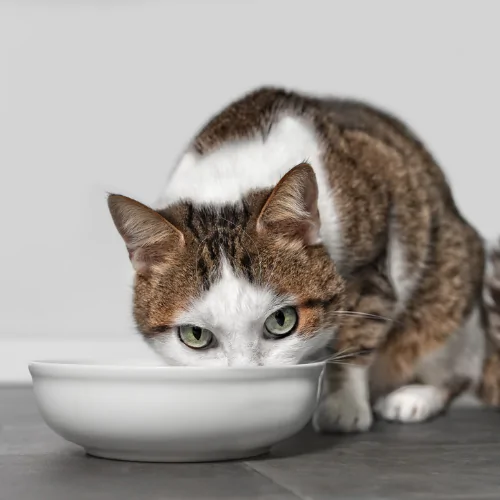
What human foods can cats eat?

Dr Jessica May, FirstVet vet
24 April 2022
Picture this: you’ve just sat down and are ready to tuck into a meal. All of a sudden, your curious kitty is slinking over with laser focus on your plate. Obviously, they’re going to get what they want – they are in charge, after all. But before you give them a nibble, you’ll want to check that your yummy morsels are feline-friendly.
FirstVet vet Dr Jessica May goes through which human foods are safe for your cat to eat and which should stay out of reach.
- Human foods cats can eat
> Can cats eat chicken?
> Can cats eat carrots?
> Can cats eat broccoli?
> Can cats eat peas?
> Can cats eat blueberries?
> Other human foods cats can eat - Human foods cats can eat but aren’t nutritious
> Can cats eat bread and pasta?
> Can cats eat rice?
> Can cats eat bananas?
> Can cats eat cucumbers? - Human foods cats shouldn’t eat
> Can cats eat cheese?
> Can cats eat chocolate?
> Can cats eat peanut butter?
> Can cats eat nuts?
> Can cats eat avocado?
> Other human foods cats shouldn’t eat
Human foods cats can eat
First, let’s start with the human foods which are perfectly safe for your cat to enjoy. Some of these are fine for your feline to savour in small amounts, while others can actually be good for their health.
Always keep your cat’s dietary needs in mind and check with your vet before giving them something new to try. Cats are obligate carnivores, so remember to continue feeding them meat. Any food changes should be made slowly to avoid unwanted stomach upsets.
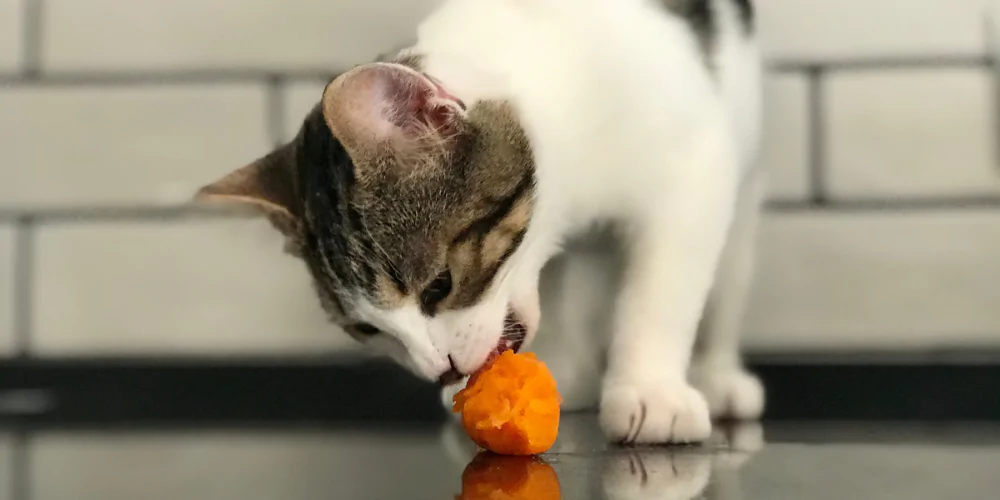
> Can cats eat chicken?
Being carnivores, some tasty chicken is almost guaranteed to go down a treat. Never feed them raw chicken – it should be cooked (ideally boiled) and all bones removed. While chicken is well-suited to your cat’s natural preferences, it should still be given as part of a balanced diet.
> Can cats eat carrots?
Carrots are a source of fibre and vitamins like potassium, manganese, and vitamins K and E. Make sure to wash and boil or steam them so they’re nice and soft, as raw carrots could be a choking hazard. Feed them to your cat in small amounts every now and then as a treat.
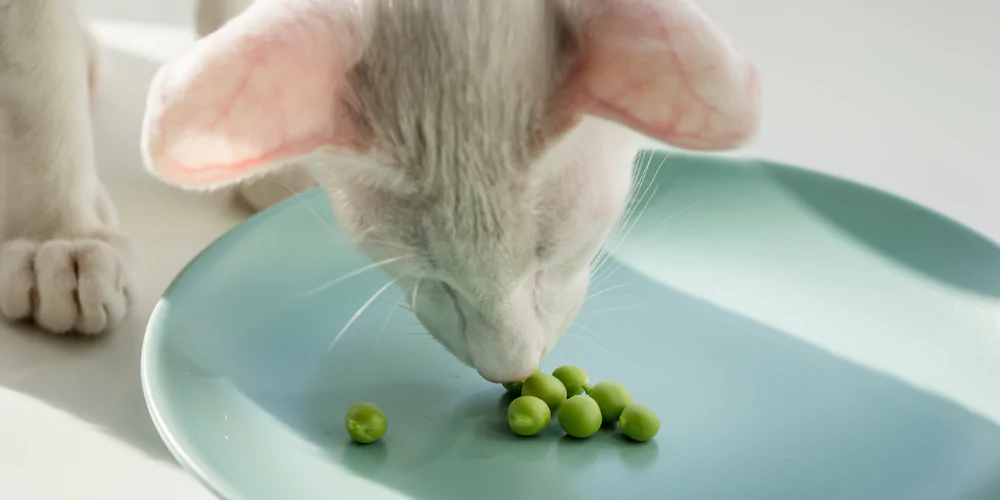
> Can cats eat broccoli?
Broccoli is full of antioxidants and is also a good source of roughage for your feline. Keep it unseasoned and steam the florets to make them easier for your cat to eat. If you want to give them raw broccoli, make sure to cut it up into small, easily chewable bites.
> Can cats eat peas?
Garden peas and sugar snap peas are a great way to boost your cat’s iron, potassium, and vitamins B1, K, and C levels. They’re also low calorie and full of fibre which helps your feline’s digestion. Keep them bland (no seasoning) and boil or steam them. You can even leave them frozen if they’re soft enough to bite.
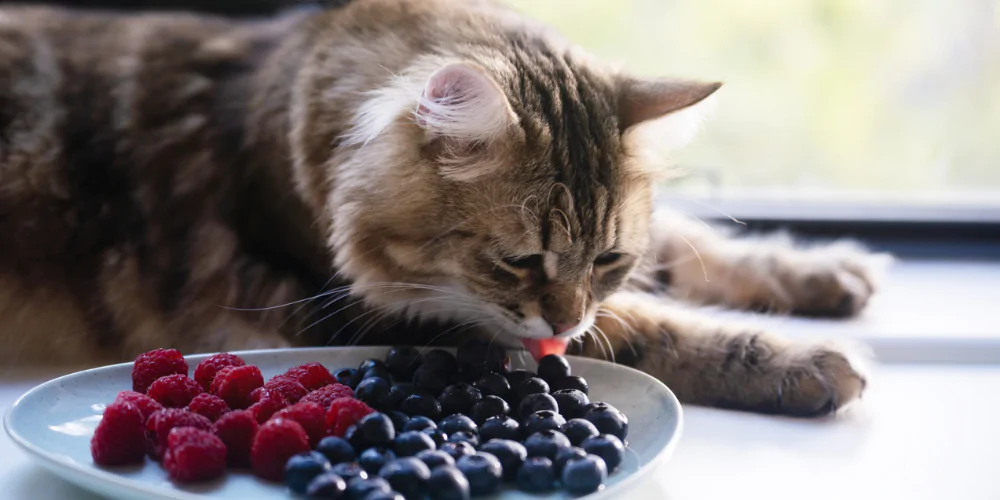
> Can cats eat blueberries?
Although they’re not exactly a superfood for felines, blueberries can still offer some nutrition. Full of water and fibre, they’re a yummy choice for the odd sweet treat. You can give your cat two or three blueberries every once in a while.
> Other human foods cats can eat
Other human foods your cat can eat include:
- Cooked meats like beef, lamb, pork or ham – meat is an absolute must for your kitty. Check it’s fully cooked and there are no bones left.
- Cooked fish and seafood – these are a good source of fatty acids to keep your cat’s coat glossy.
- Boiled or scrambled egg – cooked egg is great as an occasional treat and has the added nutritional bonus of amino acids and protein.
- Melon and watermelon – give them to your kitty for a bit of hydration, but remember to remove any seeds.
Human foods cats can eat but aren’t nutritious
There are some human foods that your cat can technically eat – but this doesn’t mean they should. Although these foods aren’t toxic, they don’t give your kitty much nutrition either, so it’s best to stay away.
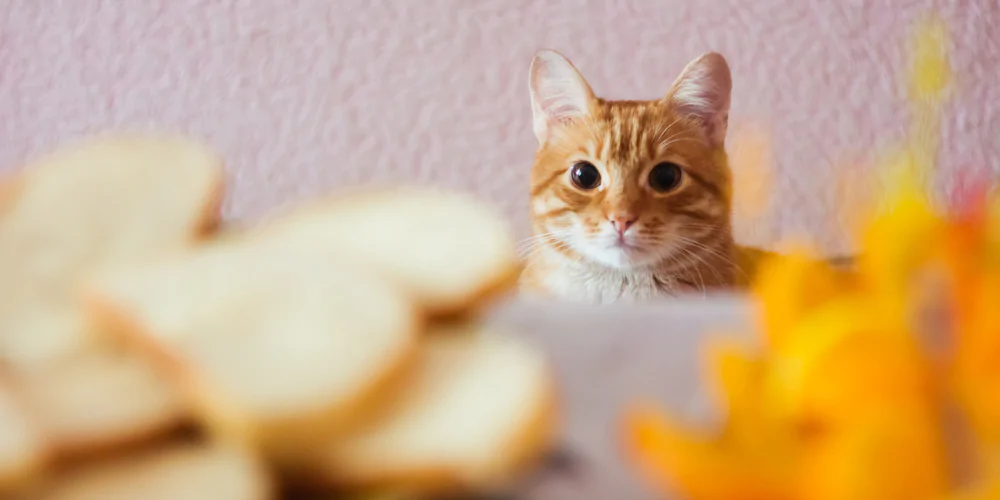
> Can cats eat bread and pasta?
Being natural carnivores, cats need lots of protein in their diet. What they don’t need so much? Carbohydrates. As bread and pasta are mainly carbs, they’re neither nutritional nor particularly exciting for your cat to eat.
> Can cats eat rice?
Cats can eat cooked rice in small amounts but, like bread and pasta, it doesn’t give them any extra nutrition. Cooked rice can sometimes be mixed with chicken for your cat to eat if they have an upset stomach.
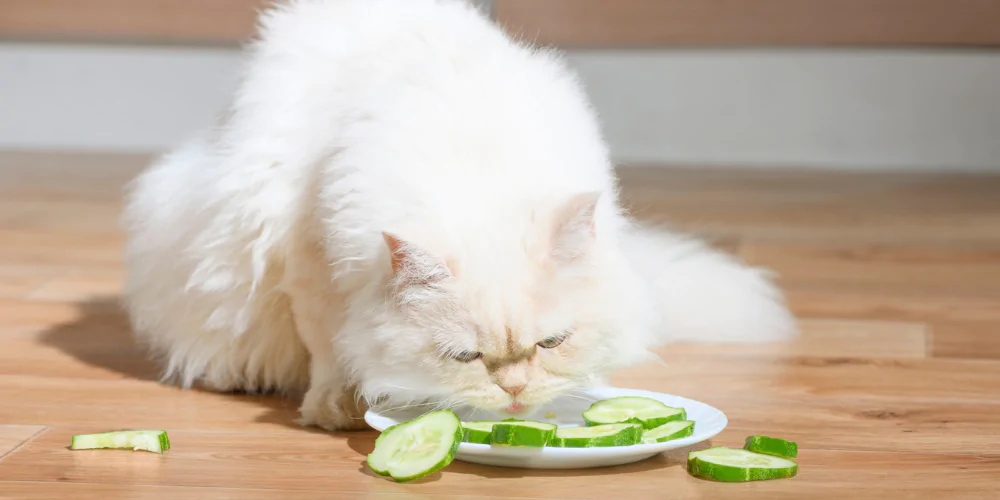
> Can cats eat bananas?
Bananas are high in sugar, so feeding too much too often to your cat could put them at risk of gaining weight and developing diabetes. A bit of banana might be fine as a rare treat, but if in doubt, always check with your vet.
> Can cats eat cucumbers?
Being low in sugar and calories, a few small pieces of cucumber won’t harm your kitty. But eating the skin can be irritating for sensitive stomachs, so be sure to remove this. Take care not to feed your cat too much cucumber as this could affect their digestion.
Human foods cats shouldn’t eat
Your cat may have perfected the pleading eyes and adorable purring, but don’t be swayed into giving these human foods. They could be toxic or choking hazards for your feline.
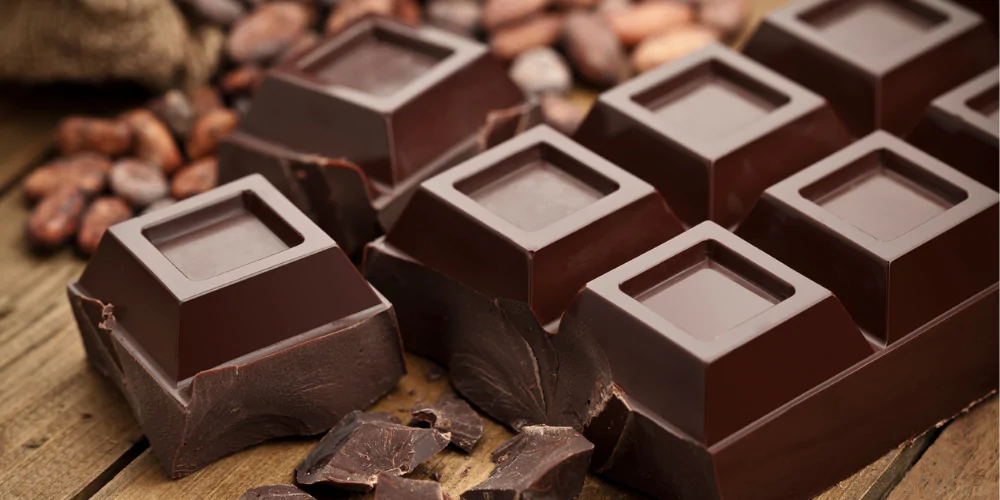
> Can cats eat cheese?
Dairy products, including cheese, are not suited to a cat’s stomach as most are lactose intolerant. The high-fat content of dairy could increase the risk of your cat getting obese over time. It could also cause vomiting and diarrhoea.
> Can cats eat chocolate?
Chocolate is a big no-no for cats (it’s highly toxic) and could be fatal if accidentally eaten. It contains theobromine, a compound that speeds up their heart rate and makes them lose bodily fluid faster. They could also contain xylitol, a sweetener that’s toxic for both cats and dogs.
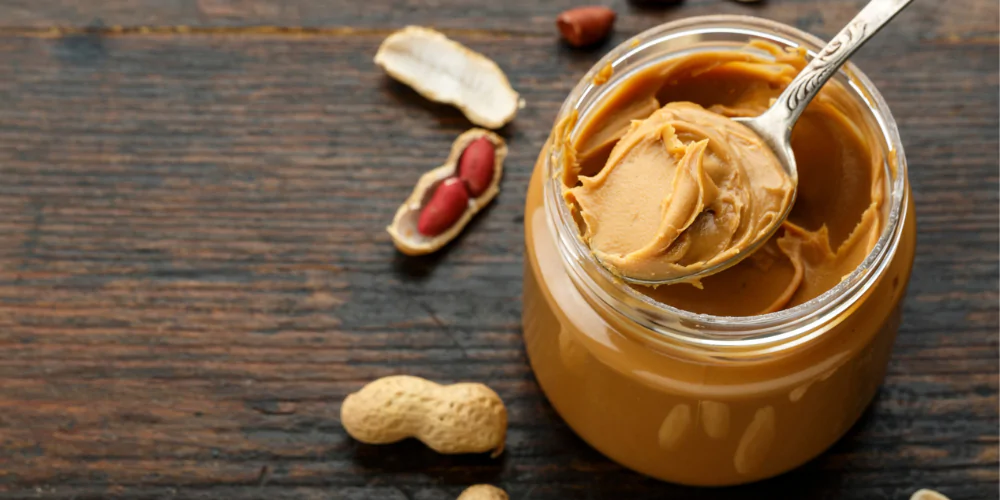
> Can cats eat peanut butter?
Natural peanut butter not only lacks any nutrition for your feline, it’s also high in fat and calorie heavy. The thick consistency could be a choking risk and can also cause stomach upset. Your cat could even have a peanut allergy. Some processed peanut butter also contains artificial sweeteners which are extremely toxic to cats.
> Can cats eat nuts?
The size and shape of nuts make them a possible choking hazard for cats. From pistachios to almonds and brazil nuts, they can be hard to digest and are also high in fat and calories.
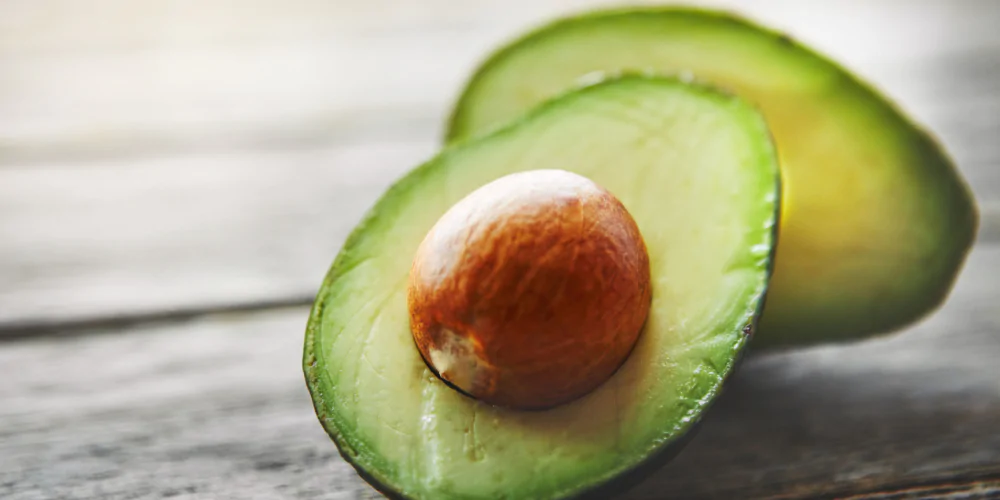
> Can cats eat avocado?
Avocado is another food with a high-fat content that can lead to obesity and pancreatitis. They may also be toxic in large amounts.
> Other human foods cats shouldn’t eat
Other human foods your cat should steer clear from are:
- Onions, chives, garlic, and leeks – toxic in all forms, containing compounds that could damage your cat’s red blood cells and lead to anaemia.
- Grapes and raisins – could cause organ failure.
- Citrus fruits – fruits like oranges and lemons are slightly toxic and can irritate your cat’s stomach.
- Any foods with added seasonings – human foods that are safe to feed your cat should be served plain.
When giving your cat cooked food, make sure it’s served at room temperate or slightly warmer so they don’t burn their mouths.
If you’re worried your cat has accidentally eaten something they shouldn’t, call your vet immediately. If you’re a Petsure customer, you have free 24/7 access to video calls with a FirstVet vet for help in an emergency.
Have peace of mind that your feline is covered for food-related emergencies. Get a cat insurance quote from Petsure today.


